Economic importance of soil • Economic importance

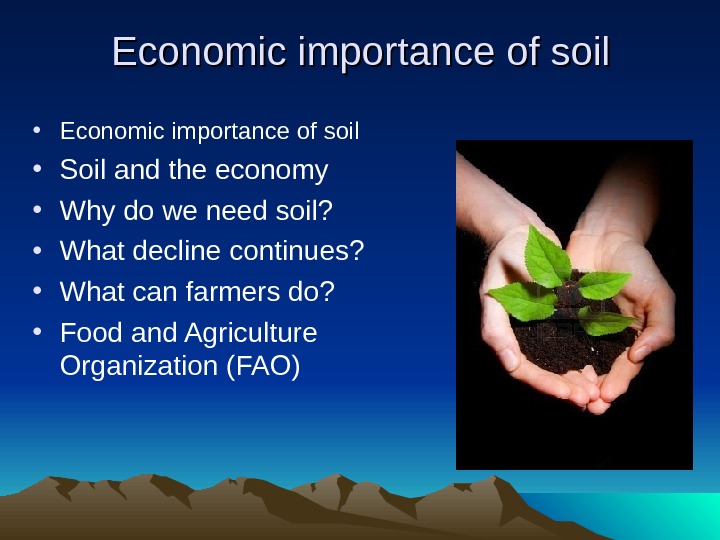
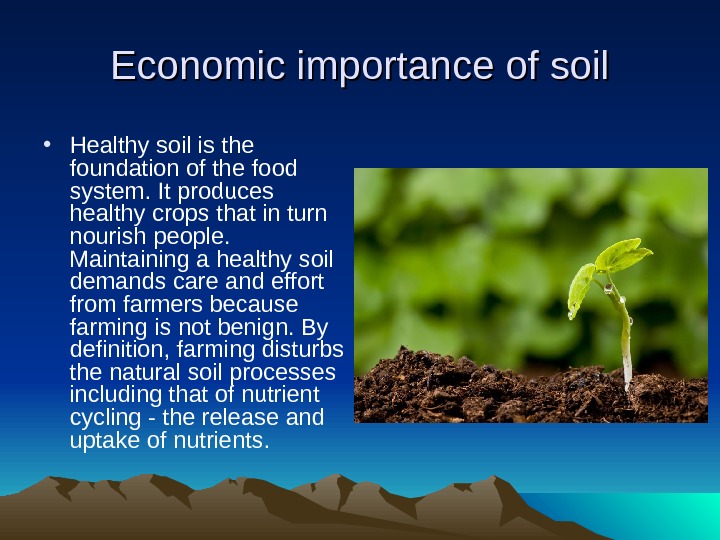
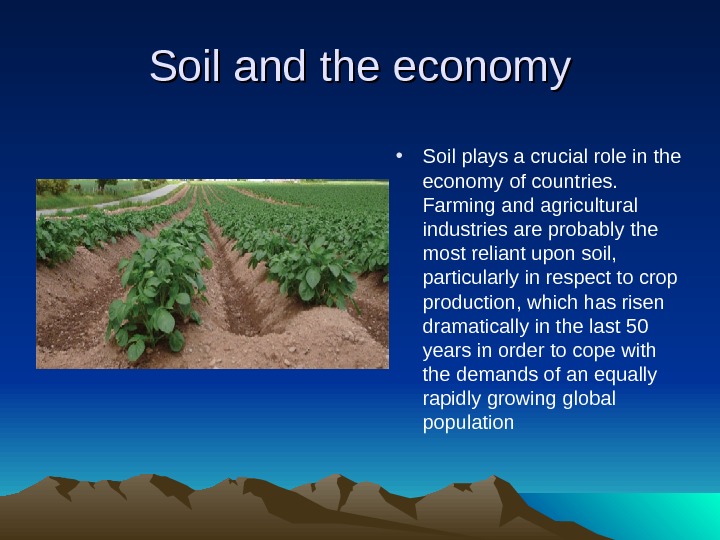
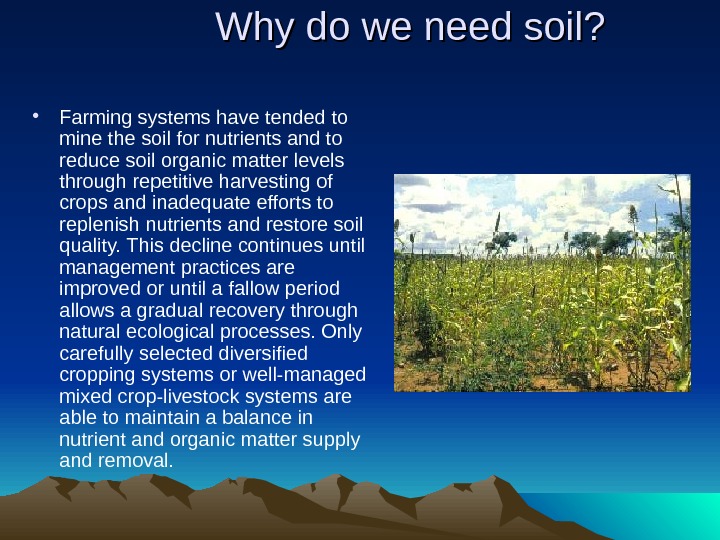
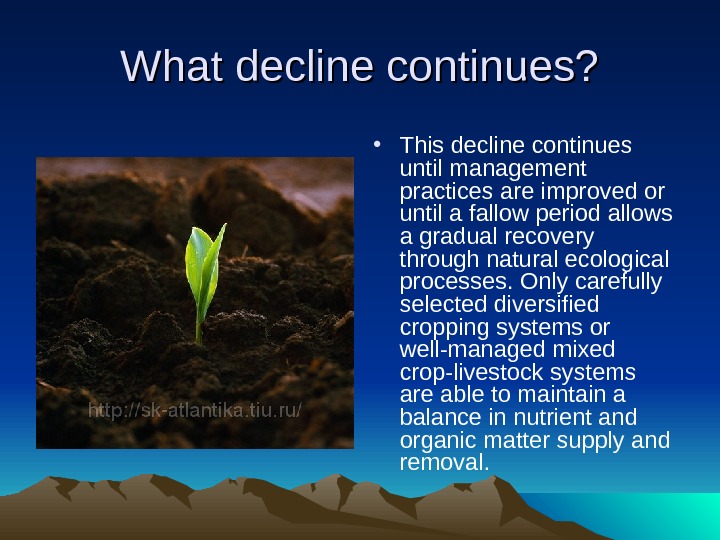
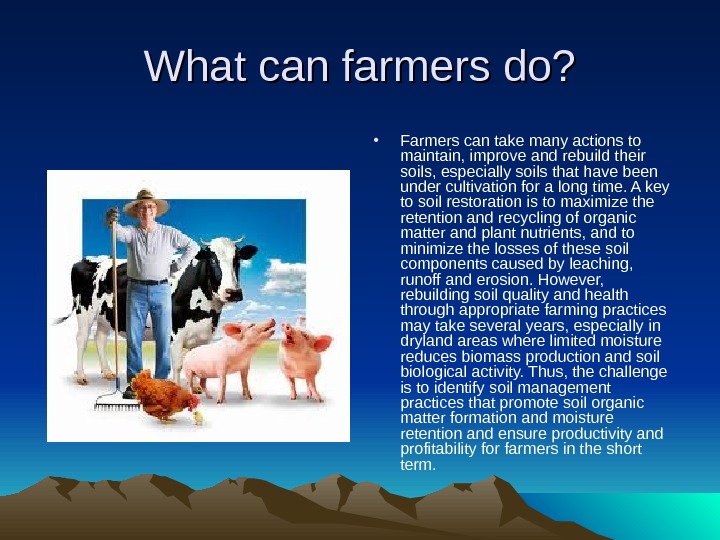
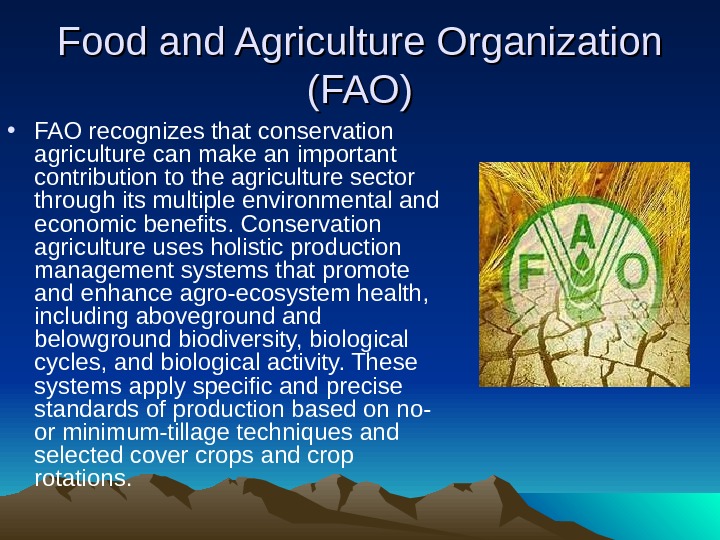
economic_importance_of_soil.ppt
- Размер: 314 Кб
- Количество слайдов: 7
Описание презентации Economic importance of soil • Economic importance по слайдам
 Economic importance of soil • Soil and the economy • Why do we need soil? • What decline continues? • What can farmers do? • Food and Agriculture Organization (FAO)
Economic importance of soil • Soil and the economy • Why do we need soil? • What decline continues? • What can farmers do? • Food and Agriculture Organization (FAO)
 Economic importance of soil • Healthy soil is the foundation of the food system. It produces healthy crops that in turn nourish people. Maintaining a healthy soil demands care and effort from farmers because farming is not benign. By definition, farming disturbs the natural soil processes including that of nutrient cycling — the release and uptake of nutrients.
Economic importance of soil • Healthy soil is the foundation of the food system. It produces healthy crops that in turn nourish people. Maintaining a healthy soil demands care and effort from farmers because farming is not benign. By definition, farming disturbs the natural soil processes including that of nutrient cycling — the release and uptake of nutrients.
 Soil and the economy • Soil plays a crucial role in the economy of countries. Farming and agricultural industries are probably the most reliant upon soil, particularly in respect to crop production, which has risen dramatically in the last 50 years in order to cope with the demands of an equally rapidly growing global population
Soil and the economy • Soil plays a crucial role in the economy of countries. Farming and agricultural industries are probably the most reliant upon soil, particularly in respect to crop production, which has risen dramatically in the last 50 years in order to cope with the demands of an equally rapidly growing global population
 Why do we need soil? • Farming systems have tended to mine the soil for nutrients and to reduce soil organic matter levels through repetitive harvesting of crops and inadequate efforts to replenish nutrients and restore soil quality. This decline continues until management practices are improved or until a fallow period allows a gradual recovery through natural ecological processes. Only carefully selected diversified cropping systems or well-managed mixed crop-livestock systems are able to maintain a balance in nutrient and organic matter supply and removal.
Why do we need soil? • Farming systems have tended to mine the soil for nutrients and to reduce soil organic matter levels through repetitive harvesting of crops and inadequate efforts to replenish nutrients and restore soil quality. This decline continues until management practices are improved or until a fallow period allows a gradual recovery through natural ecological processes. Only carefully selected diversified cropping systems or well-managed mixed crop-livestock systems are able to maintain a balance in nutrient and organic matter supply and removal.
 What decline continues? • This decline continues until management practices are improved or until a fallow period allows a gradual recovery through natural ecological processes. Only carefully selected diversified cropping systems or well-managed mixed crop-livestock systems are able to maintain a balance in nutrient and organic matter supply and removal.
What decline continues? • This decline continues until management practices are improved or until a fallow period allows a gradual recovery through natural ecological processes. Only carefully selected diversified cropping systems or well-managed mixed crop-livestock systems are able to maintain a balance in nutrient and organic matter supply and removal.
 What can farmers do? • Farmers can take many actions to maintain, improve and rebuild their soils, especially soils that have been under cultivation for a long time. A key to soil restoration is to maximize the retention and recycling of organic matter and plant nutrients, and to minimize the losses of these soil components caused by leaching, runoff and erosion. However, rebuilding soil quality and health through appropriate farming practices may take several years, especially in dryland areas where limited moisture reduces biomass production and soil biological activity. Thus, the challenge is to identify soil management practices that promote soil organic matter formation and moisture retention and ensure productivity and profitability for farmers in the short term.
What can farmers do? • Farmers can take many actions to maintain, improve and rebuild their soils, especially soils that have been under cultivation for a long time. A key to soil restoration is to maximize the retention and recycling of organic matter and plant nutrients, and to minimize the losses of these soil components caused by leaching, runoff and erosion. However, rebuilding soil quality and health through appropriate farming practices may take several years, especially in dryland areas where limited moisture reduces biomass production and soil biological activity. Thus, the challenge is to identify soil management practices that promote soil organic matter formation and moisture retention and ensure productivity and profitability for farmers in the short term.
 Food and Agriculture Organization (FAO) • FAO recognizes that conservation agriculture can make an important contribution to the agriculture sector through its multiple environmental and economic benefits. Conservation agriculture uses holistic production management systems that promote and enhance agro-ecosystem health, including aboveground and belowground biodiversity, biological cycles, and biological activity. These systems apply specific and precise standards of production based on no- or minimum-tillage techniques and selected cover crops and crop rotations.
Food and Agriculture Organization (FAO) • FAO recognizes that conservation agriculture can make an important contribution to the agriculture sector through its multiple environmental and economic benefits. Conservation agriculture uses holistic production management systems that promote and enhance agro-ecosystem health, including aboveground and belowground biodiversity, biological cycles, and biological activity. These systems apply specific and precise standards of production based on no- or minimum-tillage techniques and selected cover crops and crop rotations.

